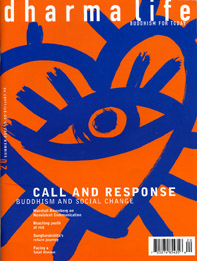The Buddha and the Sahibs
The Men who Discovered India's Lost Religion
Charles Allen
John Murray, 2002, UK only £25 h/b
There was a time when books about British India were gung-ho affairs about the Jolly Good Chaps – and the occasional Chappess – who brought pax Britannica, the light of understanding, to the savages and religious zealots of the Subcontinent. In these distant times the term 'Orientalist' was a badge to be worn with pride, a sign of scholarship and perhaps also of a certain benevolent understanding. Then, in 1978 came Edward Saïd's Orientalism, a robustly-argued attack on the power-plays that lay behind western representations of the 'East' in art, literature and scholarship. Departments of Oriental studies were thrown into confusion and hastily rebranded themselves. The term 'orientalist' was dropped. Scholars fell over each other to demonstrate that their endeavours were not tainted by the presumed evils of the colonial past.
Charles Allen's The Buddha and the Sahibs, while not exactly a return to the days of Jolly Good Chaps, is nevertheless a conscious rebuttal to Saïd, and an attempt to demonstrate that the orientalists were human beings whose passion for understanding the cultures of the East brought benefits as much as they did disadvantages. Allen's particular concern in is the western discovery, or rediscovery, of Buddhism. He sets out a cast of characters who are both bizarre and remarkable: 'Oriental' Jones, a man of prodigious scholarship; the crazed Madame Blavatsky and her theosophical heirs; and the poet, editor of the Daily Telegraph and opium enthusiast, Sir Edwin Arnold.
It is clear that Allen is on a surer footing when referring to western sources than to sources within the Indian tradition. His assertion that the Bhagavad Gita is a part of the Ramayana rather than of the Mahabharata is a glaring error. And few Buddhists, I suspect, would make any sense of his rendering of the Sanskrit atman as 'the universal soul within which the human spirit is an indivisible yet individual part' – a conception that Allen attributes to Buddhism. Nevertheless, this book is an often fascinating introduction to the painstaking and obscure pathways by which the western world has come to understand Buddhism and by which India rediscovered her Buddhist heritage.
Whatever side they might choose to come down upon in the orientalist debate, it is clear that those in the Buddhist world today owe much to these Jolly Good Chaps. And, of course, to the occasional Chappess.
Will Buckingham



